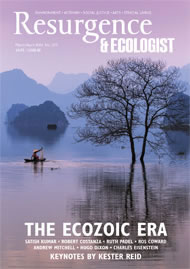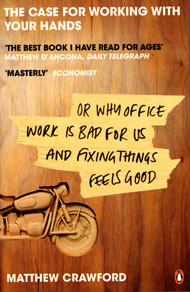I’m young enough to testify that our education system still looks down on qualifications leading to a living earned by trade. But I’m also old enough to be among those visited by anxieties about one’s sense of self as an employee in the knowledge economy, where one of the most fearsome questions to be asked at a party is “So, what is it that you do?” The point at which these two fault lines meet gives rise to Matthew Crawford’s highly stimulating book The Case for Working with Your Hands, which stands up for the intellectual demands of handiwork, as part of broader anti-zeitgeist philosophising on education and employment.
Surnames like Baker and Miller suggest that one’s vocation was once something that one was, rather than something that one simply did. They suggest a recognised purpose within a community, and a strong sense of identity. Today, by contrast, it is becoming increasingly in vogue to talk about one’s work/life balance, as if one were not plainly a subset of the other. Examining how this shift occurred, Crawford argues that most jobs have been drained of the need for intellectual engagement, to the point that workers valued for their ostensibly superior education are becoming actively stupider. And with individual jobs being subsumed into globalised processes, he concludes that we are divorcing ourselves from the things that we rely upon, to the detriment of our moral and intellectual character.
Crawford begins from the obvious (if rarely articulated) point that the plumber who can fix the BA graduate’s gushing tap is a hell of a lot smarter than their respective standings in society would credit. From here, he meditates on how the works of thinkers like Aristotle, Marx, Heidegger and Arendt come to bear on a toilet that won’t flush – resulting in far-reaching conclusions on morality, economics and culture. His points are frequently convincing, with the book’s best chapters shot through with insight on each page. When he paints today’s job market as a vacuous, dystopian extension of the Taylorist logic that led to the assembly line a century ago, it feels as if he is pointing towards a blueprint for a far better way of living – where the apparently competing demands of capitalism and community are reconciled, while restoring a sense of agency to the individual.
Crawford is specifically rallying at the dehumanised homogenisation effect of globalisation and new capitalism, but his repeated calls for ‘personal responsibility’ betray a libertarian streak, placing him in a margin of the political spectrum rarely known for its environmentalists. But any reader with an eye on environmental issues cannot fail to build the bridge from Crawford’s arguments to something resembling the fabric of a more sustainable culture – one built around humanised community, localisation and reconnection with the things that we rely upon.
So whether or not you’re convinced by the nuances of Crawford’s philosophising, The Case for Working with Your Hands remains an engaging and radical book simply by virtue of calling into question the legitimacy of holding certain means of employment in higher esteem than others. As a catalyst for rethinking our attitudes towards work, how work shapes individuals, and how individuals engage with society, Crawford’s book is a lonely, yet powerful voice within the narrowing parameters of the knowledge economy – but a voice as welcome as it is vital.








